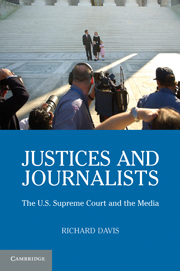2 - The Pressure to Go Public
Published online by Cambridge University Press: 05 June 2012
Summary
In 1990, the Supreme Court press corps held its traditional reception for a new justice joining the Court. That new justice, David Souter, mingled with reporters at the off-record session. At the end of the reception, however, Souter turned to the press corps and said: “Well, thank you for this. I enjoyed it. Let's do it again when I retire.”
The notion that a powerful individual in the shaping of public law and policy would not interact with the press throughout his tenure in office may seem shocking to most Americans, except when that person is a U.S. Supreme Court justice. In fact, Souter's attitude, in juxtaposition with his power, expresses the paradox for the Court. Although the justices desire to convey the image that they are above politics, in fact, as members of the third branch of government, they have a significant role in shaping public policy. That role places them in the midst of public policy debates and requires them to promote that desired image of distance to preserve their public policy role. Otherwise, they would be treated like other policy actors and lose their status as resolvers of public policy conflicts.
Formally, the justices' public approach to the press can be explained by a code of judicial ethics, which limits judicial behavior off the bench. Although U.S. Supreme Court justices technically are not bound by that code, they usually consider themselves constrained by it nonetheless.
- Type
- Chapter
- Information
- Justices and JournalistsThe U.S. Supreme Court and the Media, pp. 18 - 33Publisher: Cambridge University PressPrint publication year: 2011



